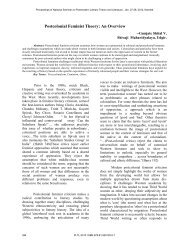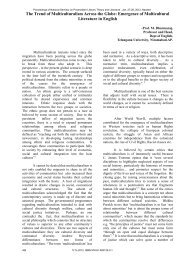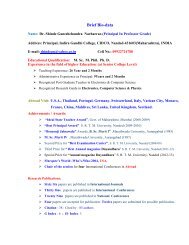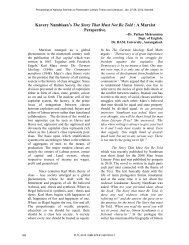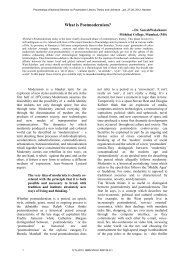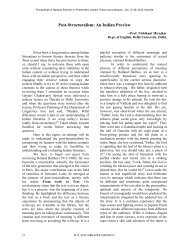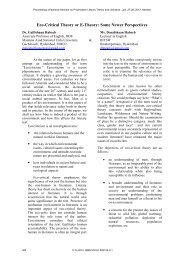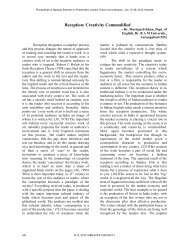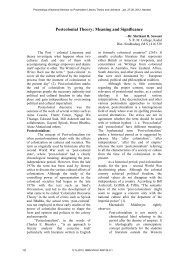Proceedings of National Seminar on Postmodern ... - Igcollege.org
Proceedings of National Seminar on Postmodern ... - Igcollege.org
Proceedings of National Seminar on Postmodern ... - Igcollege.org
You also want an ePaper? Increase the reach of your titles
YUMPU automatically turns print PDFs into web optimized ePapers that Google loves.
<str<strong>on</strong>g>Proceedings</str<strong>on</strong>g> <str<strong>on</strong>g>of</str<strong>on</strong>g> <str<strong>on</strong>g>Nati<strong>on</strong>al</str<strong>on</strong>g> <str<strong>on</strong>g>Seminar</str<strong>on</strong>g> <strong>on</strong> <strong>Postmodern</strong> Literary Theory and Literature , Jan. 27-28, 2012, Nanded<br />
Books by Indian writers and writers having Indian origin have always proved appealing to Indian<br />
film makers; it is <strong>on</strong>ly in recent times that there has been an increase in numbers <str<strong>on</strong>g>of</str<strong>on</strong>g> adaptati<strong>on</strong>s <str<strong>on</strong>g>of</str<strong>on</strong>g> Indian<br />
author writing in English. The unf<strong>org</strong>ettable brilliant film “Guide” was possibly <strong>on</strong>e <str<strong>on</strong>g>of</str<strong>on</strong>g> the first cinematic<br />
adaptati<strong>on</strong>s <str<strong>on</strong>g>of</str<strong>on</strong>g> an English novel by an Indian author.<br />
As far as cinematic adaptati<strong>on</strong> <str<strong>on</strong>g>of</str<strong>on</strong>g> novels in Indian languages is c<strong>on</strong>cerned special menti<strong>on</strong> must<br />
be made <str<strong>on</strong>g>of</str<strong>on</strong>g> the repeatedly remade and widely successful “Devdas” based <strong>on</strong> famous novel by Sarat<br />
Chandra Chattopadhyay. In fact there are some five films with the same name, based <strong>on</strong> this novel al<strong>on</strong>e.<br />
It even got adapted to fit today’s youth by changing the tragic ending and not killing the protag<strong>on</strong>ist, but<br />
instead making him realize his folly in the critically acclaimed “Dev D”. So this is the change according<br />
to the commercial c<strong>on</strong>siderati<strong>on</strong>s and youth centric views.<br />
A good novel by itself is not enough; bur a director has to lean <strong>on</strong> the crutches <str<strong>on</strong>g>of</str<strong>on</strong>g> good dialogues<br />
and script to create the desire impact <strong>on</strong> his audience. The originality <str<strong>on</strong>g>of</str<strong>on</strong>g> thought and subject matter<br />
attracts film makers to make the film <strong>on</strong> the book. Besides, the simple narrative style <str<strong>on</strong>g>of</str<strong>on</strong>g> the book also<br />
made it easy to make a film script out <str<strong>on</strong>g>of</str<strong>on</strong>g> the book. Nazarian Eric comments <strong>on</strong> adaptati<strong>on</strong> as:<br />
“Adapting novel into films is no easy task. The job is by no means simpler because a<br />
story already exits. Adapting literature requires a great deal <str<strong>on</strong>g>of</str<strong>on</strong>g> reading, thinking,<br />
eliminating and compressing words, character and time frames.”<br />
Nazarian, Eric (2000). Prose and Pictures: Adapting Literature into Film.<br />
Definiti<strong>on</strong>s <str<strong>on</strong>g>of</str<strong>on</strong>g> film adaptati<strong>on</strong> include transfer <str<strong>on</strong>g>of</str<strong>on</strong>g> <strong>on</strong>e medium to another. Film adaptati<strong>on</strong> is<br />
defined as,<br />
“The process <str<strong>on</strong>g>of</str<strong>on</strong>g> changing or transforming material from <strong>on</strong>e medium (novel, stage play,<br />
short story, real life story etc) into another (i.e. film <str<strong>on</strong>g>of</str<strong>on</strong>g> TV)”.<br />
Frensham, R. (Eds) (2003). Teach Yourself: Ies (3 rd Ed) Prentice Hall.<br />
Following are few fundamental obstacles to c<strong>on</strong>sider while adapting a literary text into cinema/film.<br />
1. When adapting it is important not to loose the spirit <str<strong>on</strong>g>of</str<strong>on</strong>g> the literary texts, because the original<br />
meaning <str<strong>on</strong>g>of</str<strong>on</strong>g> that text is the reas<strong>on</strong> for picking that text into film.<br />
2. Novels about in minor characters, subplots and incidental events which add to the richness <str<strong>on</strong>g>of</str<strong>on</strong>g> the<br />
work however, in film you have to c<strong>on</strong>centrate <strong>on</strong> your main characters because <str<strong>on</strong>g>of</str<strong>on</strong>g> the time<br />
c<strong>on</strong>straints.<br />
3. In novel characters and acti<strong>on</strong> <str<strong>on</strong>g>of</str<strong>on</strong>g>ten revealed through extended dialogue between characters. But<br />
screen writers frequently aim for screens that eliminate the need for dialogue. The c<strong>on</strong>venti<strong>on</strong> is<br />
that because film is so visual, it is best not to create dialogue when the meaning could easily be<br />
c<strong>on</strong>veyed in an acti<strong>on</strong>.<br />
4. Film making is essentially a co-operative team work rather than the work <str<strong>on</strong>g>of</str<strong>on</strong>g> an individual, such<br />
as a novel writing. This therefore entails the necessity <str<strong>on</strong>g>of</str<strong>on</strong>g> demanding <str<strong>on</strong>g>of</str<strong>on</strong>g> high level <strong>org</strong>anized<br />
work.<br />
5. A film is limited in the aspect <str<strong>on</strong>g>of</str<strong>on</strong>g> length and depth as well as the amount <str<strong>on</strong>g>of</str<strong>on</strong>g> material, thus, it is<br />
forced to suggest pictorially a great many things that novel can explore in more depth.<br />
541 PLTL-2012: ISBN 978-81-920120-0-1



